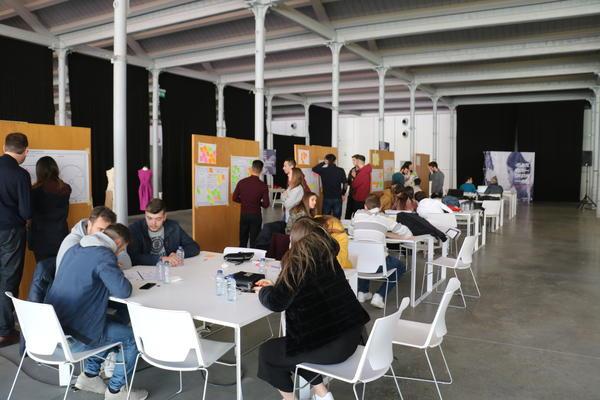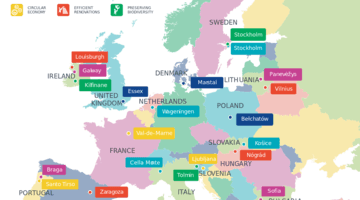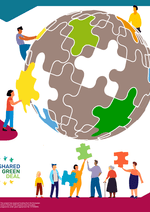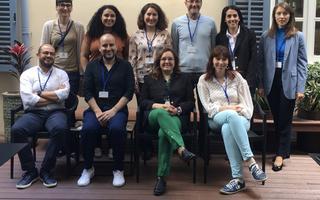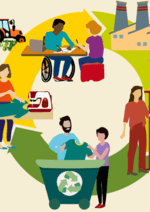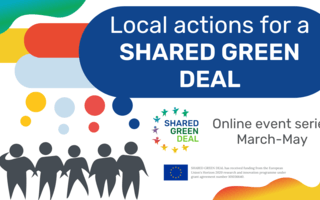Investment as a key enabler for the circular economy in Santo Tirso
This experiment aims to foresee the potential for circular synergies between the most significant sectors of the city of Santo Tirso: Clothing Textiles, Agri-food, and, more recently, Rubber and Plastic.
It will gather players from the industry, education, consumer, and associative sectors for better achieving results that can mirror reality.
The digital and physical infrastructures already in place, namely the online platform for mapping investment opportunities - Go Business - and the fashion and clothing incubator - IMoD,- respectively, will be used to expand the local accelerator hub (LAH) success.
Local Context
Santo Tirso is in the center of the Porto Metropolitan area and is marked by a dense network of urban centers. It has brought investment to the city through the creation of several initiatives to promote entrepreneurship. Currently, over 600 companies are already installed in this territory. Amongst the most significant sectors are Clothing Textiles, Agri-food, and, more recently Rubber and Plastic.
In 2016, the Manufacture of Textiles and the Garment Industry accounted for 28.1% and 25.7% of GVA in manufacturing, respectively. A local incubator was set up in 2015 and has hosted more than 10 start-ups, including 2 circular businesses. This incubator is in the dismantled textile factory, Fábrica de Santo Thyrso, which was refurbished and requalified and is considered a good practice in the field of Circular Economy by CCDRN, which is the Norte Portugal Regional Coordination and Development Commission. In the same 43,000 square meters, a fashion and design incubator (IMoD) was created, including all the necessary equipment to develop businesses.
Specific Needs and Challenges
The Local Incubator was very successful in some sectors, such as the Cultural and Creative Industries. However, the current challenge is to achieve the same level of results in the Textile Sector. A strategy to develop and bring investment in this field was set up, however, it could only reach a few changemakers as the program needed to be stopped because of the pandemic; the IMoD infrastructure having been turned into a vaccination post. The opportunity to create circular synergies in this area arises again with the analysis of the most relevant sectors: textile, agrofood, and plastics. The assessment of this opportunity is one of the focus points of this social experiment, which can be even more challenging due to communication gaps between players.
Detailed Description of the Experiment
The social experiment will start with the collection of good practices, in the form of in-depth interviews and a questionnaire open to all inhabitants of Santo Tirso to answer. It will also serve to ascertain necessities, challenges, and opportunities from the viewpoint of consumers and spread awareness about circularity and its potential entrepreneurial and environmental benefits. At the same time, interviews will be carried out to investigate the supply side.
Afterwards, the workshops will take place by shedding light on possible circular synergies between stakeholders from three sectors, namely, clothing textiles, agri-food, and rubber and plastic, the consumers, and all other relevant stakeholders from the value chain.
In workshop 1, the purpose will be to engage with all stakeholders from the supply side and understand what exactly are the resources available, for later, to be able to cross them with the necessities and opportunities identified based on the questionnaires collected from inhabitants of Santo Tirso.
At this point, the mapping of the local context will be finished, which is very important not only for the development of the experiment but also for further enrichment of the Go business platform which will be enhanced to host the LAH by the end of all workshops. By then, the development and translation of all documents to be delivered will also take place.
In workshop 2, the results from the interviews and the mapping of good practices will be connected in the perspective of problem setting and solution finding. This means that participants will deepen the investigation of this analysis by brainstorming possible circular solutions. It is expected that in this workshop all relevant stakeholders from the circular value chain will discuss the barriers to create circular practices, including not only companies from the three sectors but also research institutions and waste management organizations.
The crossing between available resources, the challenges and the connected solutions with the necessities felt by consumers will afterward be explored in workshop 3. This workshop will be open to consumers, in addition to all previously mentioned stakeholders. The purpose is to test the gaps in the solutions presented, enhancing them to meet the consumers’ needs and expectations.
By the end of all three workshops, at least three circular business/project ideas are expected to be developed in order to have minimum content for the circular business award, organized during the closing ceremony of the social experiment. It will help disseminate results and create awareness for circularity and its economic benefits amongst the inhabitants of Santo Tirso.
Local Engament
The stakeholders involved will be the nine incubated companies located in the Factory of Thyrso. These companies have an innovative profile and, since more than half of them are active in the textile sector, there is potential to create circular synergies with local companies from the other sectors chosen for the experiment. The aim is also to include organizations that support disabled and vulnerable groups such as the Cooperativa de Apoio à Integração do Deficiente and Casa de Acolhimento Sol Nascente.
Partners
- The Invest Team, part of the Economic Development Department of Santo Tirso Municipality, will bring positive contributions due to its massive experience in incubating companies.
- The Commercial and Industrial Association will help to reach more potential stakeholders.
- The Agricultural Professional School Conde de São Bento can provide the necessary infrastructure to develop investigations for the valorization of bioproducts.
- The Waste Management Facilities Resinorte is an entity that besides selective collection, offers products that contribute to the creation of circular loops, such as the energetic valorization of biowaste or the treatment of recycled materials.
Additional Remarks
The context of Santo Tirso is relatively difficult for the agri-food sector. Even though there are relevant players in the area, almost all are reluctant to join any activity; in fact, they are reticent to open dialogue.
Engagement through communication via online channels is a challenge since this is not culturally anchored in the usual way of interacting at the local level. Other means of communication will be considered to maximize participation.
Local partner
Município de Santo Tirso
Country
Portugal
Number of inhabitants
67,785
City
Santo Tirso
Website/social media
Contact person:
Vera Araújo, Head of INVEST Santo Tirso
varaujo [at] cm-stirso [dot] pt
May-Aug 2023
LAH & Communication Plan Development
Jun 2023
Data collection part 1
Sep 2023
Workshop 1
Oct 2023
Workshop 2
Nov 2023
Workshop 3
Apr 2024
Study tour
May 2024
Circular Economy Award
Jun 2024
Data collection part 2
Related Green Deal Priorities
TIMELINE
Case Study Guides
|
Find out more


CONTACT
For further details please contact co-leads Professor Chris Foulds (chris.foulds@aru.ac.uk) and Professor Rosie Robison (rosie.robison@aru.ac.uk).

This project has received funding from the European Union’s Horizon 2020 research and innovation program under grant agreement No 101036640. The sole responsibility for the content of this website lies with the SHARED GREEN DEAL HAS project and does not necessarily reflect the opinion of the European Union.
